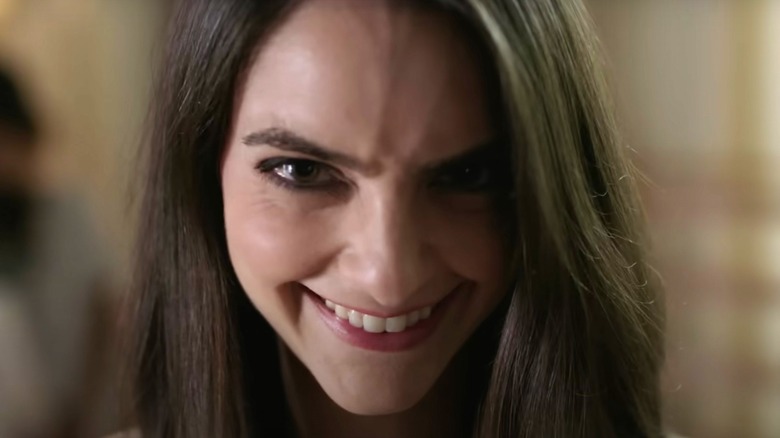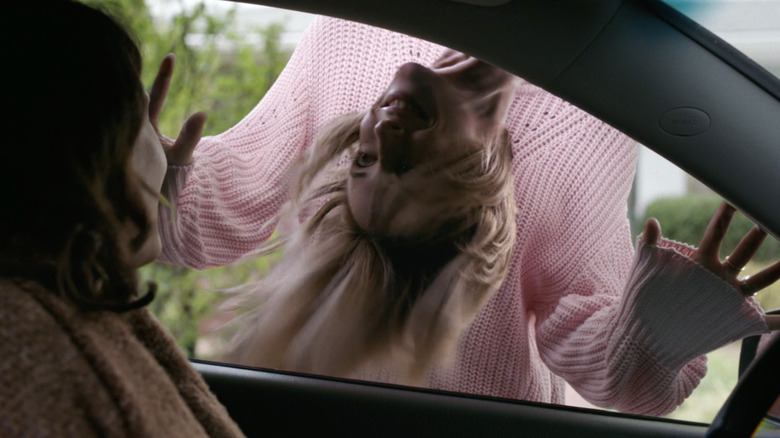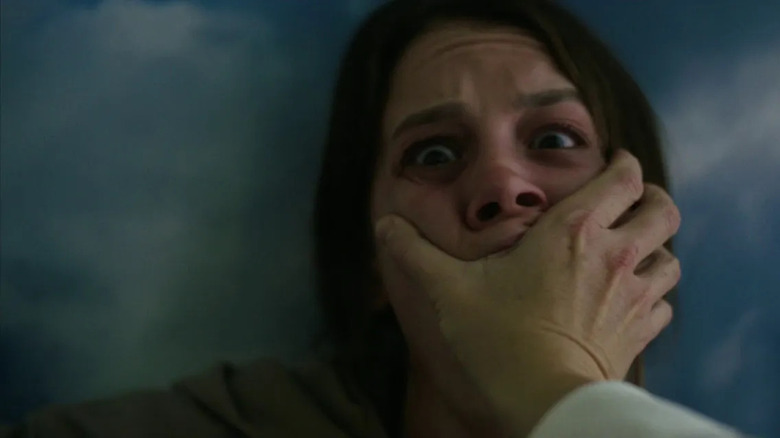Smile Review: That's The Last Thing You'll Do After Seeing This
- - One of the scariest studio movies in years
- - Equally effective at delivering jump scares and as a haunting character study
- - Excellent lead performance from Sosie Bacon
- - Occasionally veers towards exploitation in its portrayal of dark subject matter
Horror films have always grappled with themes of grief and mental health, using fantastical allegories to examine what it's like to feel alone in the world, unable to control the darkest of thoughts. In its ideas, Parker Finn's directorial debut "Smile" doesn't offer anything that won't already be familiar to seasoned horror fans, but its dark metaphor for depression is novel in its bluntness for a project hailing from a major studio. Picking up the baton from indie auteurs like Ari Aster (from whom "Smile" liberally borrows), Finn's film might be the bleakest to ever score through-the-roof-ratings at test screenings, a sign that the indie horror hits of recent years have quickly become as canonized among fans as they are among critics.
Even your average cinemagoer will be able to easily spot a thematic link to a film like "Hereditary," another tale of a strange, passed-down curse wrapped up in a haunting character study about inter-generational trauma. While "Smile" is effective as a horror movie in its own right, it's perhaps most significant as the first major studio release to share a kinship with the moodier efforts that have recently emerged from independent studios, which are already starting to feel like part of the horror genre's furniture. Works like Aster's aforementioned debut or "It Follows" — another film to which Finn owes significant debt here — already feel like they're becoming as vital to new horror filmmakers as "Halloween" or "Texas Chain Saw Massacre," with "Smile" being the first major studio release to wear their influence firmly on its sleeve.
Breathing new life into old jump scares
Sosie Bacon stars as Dr. Rose Cotter, a psychiatrist whose biggest flaw is trying to give her patients more help than the system allows. We're introduced to her being reprimanded by her boss (Kal Penn) for giving treatment to a patient who hasn't got the money to continue paying for their care. Any insinuation that this might blossom into full-blooded political commentary goes out the window when Rose has to tend to Laura (Caitlin Stasey, reprising her role from "Laura Hasn't Slept," Finn's short film and the inspiration for the movie), a patient admitted in an emergency due to increasingly intense visions. While trying to parse why Laura keeps seeing strangers smiling at her in increasingly terrifying ways as they warn of her impending demise, Rose suddenly sees her fly across the room in a panic, unable to help her.
Laura dies by suicide in front of her but not before she passes on a curse — and as Rose will soon discover, she will become plagued by the same visions, with only four days until her own death. Enlisting the help of detective Joel (Kyle Gallner), she tries to see if there's any way to stop this by going back through the chain of people cursed, something that's easier said than done when the visions are growing more intense. To make matters worse, her family history of severe mental health issues is making it near impossible to get friends and loved ones to believe her in a time of existential crisis.
The biggest challenge Finn faces when fleshing out the narrative of his earlier short film to feature length is maintaining a respectful angle on its depiction of mental illness without compromising on the scares. In terms of the latter, "Smile" is a success, placing the audience firmly into Rose's head space with no room for escape, let alone a moment of levity. Even the abundance of jump scares and violent nightmare sequences don't result in the release of any tension. Finn only utilizes them at moments that don't fit conventional horror movie rhythms, at one point even cutting away from such a scene entirely, as if to suggest that audiences have far more to be worried about than yet another sudden appearance of an otherworldly figure warning our protagonist she's going to die soon. While the narrative may not win points for originality, Finn's eye for subverting the expected scares results in the film becoming the most haunting studio release in quite some time.
If you or anyone you know is having suicidal thoughts, please call the National Suicide Prevention Lifeline by dialing 988 or by calling 1-800-273-TALK (8255).
An exploitative allegory?
But when it comes to using the film's narrative as a barely concealed metaphor for mental illness, the film isn't quite as assured. Which isn't to say it isn't inherently empathetic — the success that "Smile" does have in this regard is largely thanks to Bacon's central performance, which dominates nearly every second of the film. The actress understands that the key to her character's unravelling isn't being exposed to the curse so much as it is being treated with newfound scrutiny by everybody in her life, nobody giving her the benefit of the doubt due to a belief that the history of mental illness in her family is suddenly making itself apparent.
On a narrative level, this makes "Smile" somewhat tricky to talk about — it's both an allegory for living with such a condition and the drastic consequences when help isn't received, and yet it's also a film that makes apparent this curse has no direct ties to the character's mental state in this manner whatsoever. Bacon's performance manages to make the film feel more assured about this commentary than it actually is. You can sense that "Smile" would unravel far easier if a less assured performer, who wasn't as committed to fleshing out this reading of the character's deteriorating mental state, was in the driver's seat.
How far the film leans into exploitation is a different question. This is, of course, a film where the narrative is driven by a curse that leads those exposed to it to die by suicide, the depictions of which are unsparing, even if they are heightened in the manner you'd expect from a spooky season gore fest. It's always unwise to judge a film by its trailer, but the tone of the "Smile" teaser hinted at a far goofier outing than what's materialized, with the finished product far likelier to cause upset than I would've assumed prior to watching. Other critics I've spoken to have shared similar concerns, arguing that even though the film has nothing but empathy for its protagonist's struggles, the overarching bleakness of the narrative and the bluntness with which it addresses the topic of suicide may make it triggering for some audiences. In that regard, it manages to rival even the opening act of Ari Aster's "Midsommar" for its unsparing portrayal of this loaded subject matter.
"Smile" is one of the best horror debuts of recent years, equally strong as a somber character study and a jump scare-driven fright fest. Just be warned that, despite how it looks on the surface, there is a darkness beneath the hallucinatory dreamscape, which might prove more distressing than terrifying for many viewers.
If you or someone you know needs help with mental health, please contact the Crisis Text Line by texting HOME to 741741, call the National Alliance on Mental Illness helpline at 1-800-950-NAMI (6264), or visit the National Institute of Mental Health website.


